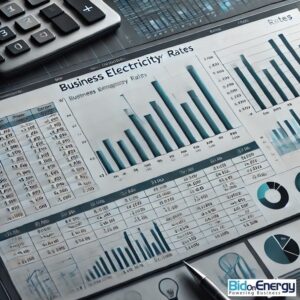How to Get the Best Electricity Rates for Your Business
Electricity costs can have a significant impact on a business's bottom line. Whether you're a small office or a large manufacturing facility, managing energy expenses is key to maintaining profitability. Finding the best electricity rates for your business not only helps control costs but also allows for more predictable budgeting. Fortunately, services like Bid On Energy simplify the process of finding competitive rates from multiple suppliers, saving you both time and money.
1. Understanding How Business Electricity Rates Work
Business electricity rates differ from residential rates in several key ways, and understanding these differences can help you make more informed decisions. There are two primary rate structures businesses need to consider:
- Fixed rates: Fixed-rate plans lock in a specific price per kilowatt-hour (kWh) for the entire duration of the contract. This provides price stability and predictability, making it easier to budget for energy expenses. However, if market rates drop, your business will not benefit from the reduction.
- Variable rates: Variable-rate plans fluctuate based on market conditions, meaning your rates could increase or decrease during the contract period. While variable rates may provide savings when energy prices are low, they come with the risk of higher costs during peak demand periods.
Additionally, businesses often face peak demand charges, which apply when energy use spikes during certain times of the day. These higher rates can significantly impact your overall costs, especially if your business operates during high-demand hours.
2. Key Factors That Affect Electricity Rates for Businesses
Several factors contribute to the electricity rates that businesses pay:
- Energy consumption: Larger businesses with high energy consumption typically receive better rates because they purchase electricity in bulk. However, businesses that experience sharp spikes in usage during peak hours may face higher rates due to demand charges.
- Location: Electricity prices vary from region to region based on local energy markets, infrastructure costs, and the availability of suppliers. In some areas, the presence of more competitors can drive prices down, while in others, a lack of competition may lead to higher rates.
- Market trends: Electricity prices can be influenced by broader market trends, such as fuel costs, changes in government regulations, and shifts in supply and demand. For example, a rise in natural gas prices can lead to higher electricity costs, while advancements in renewable energy may lower rates over time.
3. How to Compare Electricity Rates Effectively
Getting the best electricity rate for your business requires more than just looking at the price per kWh. Here’s how to compare offers effectively:
Step 1: Gather recent energy bills
Start by collecting your business’s recent energy bills. Understanding your typical energy usage, including peak demand periods, will help you accurately compare rates and plans. It’s important to have this data on hand when requesting quotes from suppliers.
Step 2: Use a comparison tool
Instead of manually reaching out to multiple suppliers, you can use platforms like Bid On Energy. Bid On Energy simplifies the process by allowing you to input your energy usage details and receive competitive quotes from a variety of trusted suppliers, all in one place.
Step 3: Evaluate the full offer
When comparing rates, don’t focus solely on the price per kWh. Look at other aspects of the contract, such as:
- Contract length: Are you locking in rates for 1, 2, or 3 years? Longer contracts might offer lower rates but reduce flexibility.
- Hidden fees: Check for extra fees such as administrative costs, penalties for early termination, or charges for exceeding consumption limits.
- Customer service: Consider the supplier’s reputation for reliability and support. A low rate is of little value if the provider has poor service.
4. Tips for Getting the Best Electricity Rates
To secure the best electricity rates, businesses can employ a few key strategies:
- Lock in rates during low-demand periods: Energy prices often fluctuate based on market conditions. If possible, try to negotiate a new contract when energy demand is low, such as during off-peak seasons. This is when prices tend to be lower, and you can lock in a better rate.
- Monitor energy usage: Conducting an energy audit can help you identify inefficiencies in your current usage. By understanding where energy is being wasted, you can reduce overall consumption, which may lead to better rate negotiations with suppliers.
- Consider renewable energy options: Many suppliers now offer green energy plans that use renewable sources like wind or solar power. These plans may provide long-term cost savings and help your business meet sustainability goals, which can be appealing to customers and partners alike.
5. How Bid On Energy Simplifies Finding the Best Rates
Navigating the energy market can be complex, especially when it comes to comparing rates from multiple suppliers. That’s where Bid On Energy comes in:
- Multiple quotes in one place: Bid On Energy allows businesses to quickly compare electricity rates from multiple suppliers, ensuring you get the best possible deal. This eliminates the need to spend hours researching and contacting individual providers.
- Time-saving: The platform does the heavy lifting by compiling quotes based on your energy usage. This frees up your time to focus on running your business, rather than getting bogged down in administrative tasks.
- Expert support: Bid On Energy also offers expert guidance to help you understand the various quotes and terms, ensuring that you choose the plan that best meets your business’s needs. Their team can answer any questions you may have about contract details or switching providers.
Securing the best electricity rates for your business is essential to controlling energy costs and improving profitability. By understanding the key factors that affect business electricity rates and using platforms like Bid On Energy, you can easily compare offers and choose the most cost-effective plan. Regularly reviewing your energy usage and monitoring market trends can help ensure that your business is always benefiting from the best rates available.
Take the first step toward reducing your energy costs today—visit Bid On Energy and find the right electricity plan for your business.

